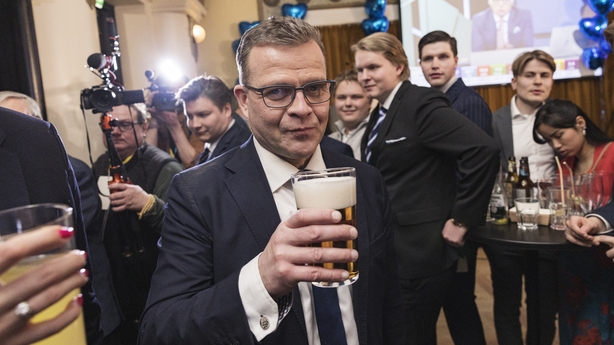Outgoing Finnish Prime Minister Sanna Marin has conceded defeat in a tight parliamentary election that handed her centre-right rival Petteri Orpo the right to try and form a coalition.
Despite gaining three seats, Marin's left-wing Social Democratic Party (SDP) came third with 43 of parliament's 200 seats behind Mr Orpo's centre-right National Coalition Party with 48 seats and the nationalist Finns on 46.
That leaves Mr Orpo with an uneasy choice of whether to court Ms Marin's SDP, whose economic policy he wants to replace, or Riikka Purra's nationalists, whose climate-sceptic, eurosceptic and anti-immigration views he opposes.
"Orpo has two options: a right-wing government together with the Finns Party in which case he would struggle to find enough (smaller) allies," said Emilia Palonen, a senior researcher in political science at the University of Helsinki.
"The other option is an alliance (with SDP) and certainly Sanna Marin is ready to negotiate for that," with her party keen to defend public services and to make sure promised cuts are not excessive, she said.
If Ms Marin, the world's youngest prime minister when she took office aged 34 in 2019, ends up outside of government, she may shift focus to a top job in Brussels, such as the 'Spitzenkandidat', the lead candidate of the European Social Democrats to head the European Commission, Ms Palonen said.

In the run-up to the election, Mr Orpo campaigned to "fix Finland" and its economy, vowing to curb spending and stop the rise of public debt, which has reached just over 70% of GDP since Ms Marin took office in 2019.
In turn, Sanna Marin's Social Democrats rallied voters to support them in their defence of the Nordic welfare model of cradle-to-grave services from free education and affordable healthcare to decent pensions, against Mr Orpo's spending cuts.
While a coalition bridging the left-right divide would not be a first of the kind in Finland, Mr Orpo and Ms Marin might struggle to agree on a joint programme for the economy, said Ilkka Ruostetsaari, professor in political science.
"In the debates, these parties' goals were very far apart from each other and that gives a challenging starting point for the coalition talks," he said.
During Ms Marin's time as prime minister, Finland faced Covid-19 lockdowns, the energy crisis and soaring consumer price inflation, and the country is expected to undergo a mild recession this year.
Most notable of Ms Marin's foreign policy actions has been her push, along with President Sauli Niinisto, for the country to make a watershed policy U-turn by seeking NATO membership in the wake of Russia's invasion of Ukraine.

